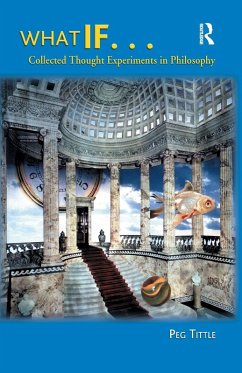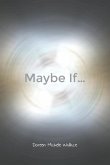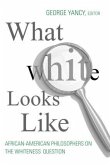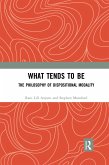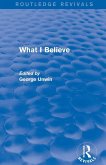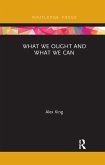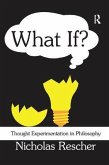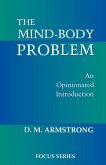What If. . .Collected Thought Experiments in Philosophy is a brief, inexpensive collection of over 100 classic and contemporary "thought experiments," each exploring an important philosophical argument.
Engaging and provocative thought experiments introduce students to the kind of disciplined thought required in philosophy, and awaken their intellectual curiosity. Featuring a clear and conversational writing style that doesn't dilute the ideas, the value of the book is in its simplicity-in both format and tone. Each thought experiment is accompanied by commentary from the author that explains its importance and provides thought-provoking questions, all encapsulated on two pages.
Product Description
What If. . . Collected Thought Experiments in Philosophy is a brief, inexpensive collection of over 100 classic and contemporary "thought experiments", each with an accompanying commentary, that explore philosophical arguments and often address a genuine problem in life. The value of the book is in its simplicity in both format and tone: Each thought experiment is accompanied by commentary that explains importance of the experiment, and questions to provoke thought and discussion, all encapsulated within two pages. The book is direct, clear and conversational but does not dilute difficult ideas.
Features + Benefits
More than 100 classic and contemporary thought experiments, excerpted from their original sources, including Putnam's Brain in a Vat, The Liar Paradox, Zeno's Achilles, Taylor's Ingenious Physiologist, Pale's Watch, Hobbes's Ship of Theseus, Parfit's Teletransporter, Quine's Gavagai, Skyrmss' Dyromaniac, Plato's Ring of Gyges, Thomson's Violinist, and Carroll's Loathe Letter, among many others.
Brief and inexpensive, What If... can be assigned as a supplement in a variety of courses, including Introduction to Philosophy, Introduction to Ethics, Applied Ethics, and Introduction to Critical Thinking.
Organized by category, the thought experiments cover the major topics found in most introduction to philosophy courses, e.g., ethics; free will and determinism; philosophy of religion, epistemology, etc.
Each thought experiment presents a puzzling situation that demands a response and demonstrates that philosophy is valuable because many of these thought experiments address a genuine problem in life.
A short "commentary" accompanies each thought experiment, highlighting the important elements of the experiment and summarizing the context in which the thought experiment developed.
Thought-provoking questions and bibliographic entries at the end of each experiment give the reader additional resources for study.
Indexes organize the content by keyword, date of publication and author for easy referencing.
Preface.
Introduction.
1. Metaphysics.
Space, Time, and Reality.
Zeno's Achilles.
Lucretius's Spear.
Berkeley's Impossibility of Conceiving the Unconcieved.
Nietzsche's Eternal Reoccurrence.
Strawson's No-Space World.
Quinton's Two-Space Myth.
Shoemaker's Time-Freezing World.
Free Will and Determinism.
Locke's Voluntary Prisoner.
James's Way Home.
Lyon's Card Predictor.
Goldman's Book of Life.
Frankfurt's Willing Addict.
Taylor's Ingenious Physiologist.
Philosophy of Religion.
Gaunilo's Lost Island.
Pascal's Wager.
Hume's Infant, Inferior, or Superannuated Deity.
Paley's Watch.
Wisdom's Long-Neglected Garden.
Hick's Resurrected People.
Hick's World with Flexible Laws of Nature.
Plantinga's Curley Smith and Transworld Depravity.
Rowe's Fawn.
2. Philosophy of Mind.
Locke's Inverted Spectrum.
Leibniz's Machine.
Turing's Imitation Game.
Kirk and Squire's Zombies.
Nagel's Bat.
Block's Chinese Nation.
Rorty's Antipodeans.
Searle's Chinese Room.
Putnam's Brain in a Vat.
Jackson's Mary, the Brilliant Color Scientist.
Searle's Brain Replacement.
3. Personal Identity.
Hobbe's Ship of Theseus.
Locke's Prince and Cobbler.
Reid's Brave Officer.
Leibniz's King of China.
William's Charles and Guy Fawkes-and Robert.
Shoemaker's Brownson.
William's Body Exchange/Mind Swap.
Perry's Divided Self.
Price's E.coli John.
Parfit's Fission.
Parfit's Teletransporter.
4. Philosophy of Language.
James' Squirrel.
Wittgenstein's Games.
Wittgenstein's "S."
Ayer's Robinson Crusoe.
Quine's Gavagai.
Putnam's Twin Earth.
5. Epistemology.
The Possibility of Knowledge.
Descartes's Evil Demon.
Russell's Five- Minute Hypothesis.
The Sources of Knowledge.
Plato's Equal Portions of Wood and Stone.
Descartes's Wax.
Molyneux's Blind Man.
Hume's Missing Shade of Blue.
Hume's Constant Conjunction.
Kant's A Priori Space.
Mill's Chaotic World.
The Conditions of Knowledge.
Gettier's Smith and Jones (and Brown in Barcelona).
Skyrms's Pyromaniac.
Harman's False Report.
Goldman's Fake Barns.
Bonjour's Clairvoyants.
Plantinga's Epistemically Inflexible Climber.
Lehrer's Mr. Truetemp.
6. Logic.
The Liar Paradox.
The Barber Paradox.
Frege's Other-Thinking Beings.
The Surprise Quiz.
Black's Two Spheres.
Goodman's Grue.
7. Ethics.
Ethical Theory.
Plato's Ring of Gyges.
Godwin's Fenelon.
Moore's Two Worlds.
Smart's Deluded Sadist.
Foot's Gas.
Brandt's Spelunkers.
Williams's Jim in South America.
Nozick's Experience Machine.
Feinberg's Egoist.
Jamieson and Regan's Chainsaw.
Jamieson and Regan's Terrorist Tank.
Thompson's Trolley Problem.
Thompson's Transplant Problem.
Donaldson's Equim.
Applied Ethics.
Thompson's Violinist.
Thompson's Growing Child in a Tiny House.
Thompson's People-seeds.
Tooley's Kitten.
Warren's Space Traveler.
Warren's Space Explorer.
Sylvan's Last People.
Rachel's Smith and Jones at the Bathtub.
Harris's Survival Lottery.
The Routley's Nuclear Train.
Regan's Lifeboat.
Caste's Hedonine and Pononine.
Battin's Automatic Reversible Contraception.
8. Social and Political Philosophy.
Locke's Acorns and Apples.
The Prisoner's Dilemma.
Hardin's Tragedy of the Commons.
Rawls' Veil of Ignorance.
Nozick's Wilt Chamberlain.
Hardin's Lifeboat.
O'Neill's Lifeboat.
Alexander's Doomsday Machine.
Marty's Two Shipwrecked Islanders.
Parfit's Nobelist.
Mills' Mr. Oreo.
9. Aesthetics.
Dewey's Finely Wrought Object.
Ziff's Eccentric and Peculiar Objects.
Danto's Randomly Generated Work of Art.
Moore's Glass Flowers.
Carroll's Loathe Letter.
10. Just on more...
Patton's Can Bad Men Make Good Brains Do Bad Things?
Index by Author.
Index by Date of Publication.
Index by Keyword.
What If. . .Collected Thought Experiments in Philosophy is a brief collection of over 100 classic and contemporary "thought experiments," each exploring an important philosophical argument. These thought experiments introduce students to the kind of disciplined thought required in philosophy, and awaken their intellectual curiosity. Featuring a clear and conversational writing style that doesn't dilute the ideas, the value of the book is in its simplicity-in both format and tone. Each thought experiment is accompanied by commentary from the author that explains its importance and provides thought-provoking questions, all encapsulated on two pages.
Hinweis: Dieser Artikel kann nur an eine deutsche Lieferadresse ausgeliefert werden.
Engaging and provocative thought experiments introduce students to the kind of disciplined thought required in philosophy, and awaken their intellectual curiosity. Featuring a clear and conversational writing style that doesn't dilute the ideas, the value of the book is in its simplicity-in both format and tone. Each thought experiment is accompanied by commentary from the author that explains its importance and provides thought-provoking questions, all encapsulated on two pages.
Product Description
What If. . . Collected Thought Experiments in Philosophy is a brief, inexpensive collection of over 100 classic and contemporary "thought experiments", each with an accompanying commentary, that explore philosophical arguments and often address a genuine problem in life. The value of the book is in its simplicity in both format and tone: Each thought experiment is accompanied by commentary that explains importance of the experiment, and questions to provoke thought and discussion, all encapsulated within two pages. The book is direct, clear and conversational but does not dilute difficult ideas.
Features + Benefits
More than 100 classic and contemporary thought experiments, excerpted from their original sources, including Putnam's Brain in a Vat, The Liar Paradox, Zeno's Achilles, Taylor's Ingenious Physiologist, Pale's Watch, Hobbes's Ship of Theseus, Parfit's Teletransporter, Quine's Gavagai, Skyrmss' Dyromaniac, Plato's Ring of Gyges, Thomson's Violinist, and Carroll's Loathe Letter, among many others.
Brief and inexpensive, What If... can be assigned as a supplement in a variety of courses, including Introduction to Philosophy, Introduction to Ethics, Applied Ethics, and Introduction to Critical Thinking.
Organized by category, the thought experiments cover the major topics found in most introduction to philosophy courses, e.g., ethics; free will and determinism; philosophy of religion, epistemology, etc.
Each thought experiment presents a puzzling situation that demands a response and demonstrates that philosophy is valuable because many of these thought experiments address a genuine problem in life.
A short "commentary" accompanies each thought experiment, highlighting the important elements of the experiment and summarizing the context in which the thought experiment developed.
Thought-provoking questions and bibliographic entries at the end of each experiment give the reader additional resources for study.
Indexes organize the content by keyword, date of publication and author for easy referencing.
Preface.
Introduction.
1. Metaphysics.
Space, Time, and Reality.
Zeno's Achilles.
Lucretius's Spear.
Berkeley's Impossibility of Conceiving the Unconcieved.
Nietzsche's Eternal Reoccurrence.
Strawson's No-Space World.
Quinton's Two-Space Myth.
Shoemaker's Time-Freezing World.
Free Will and Determinism.
Locke's Voluntary Prisoner.
James's Way Home.
Lyon's Card Predictor.
Goldman's Book of Life.
Frankfurt's Willing Addict.
Taylor's Ingenious Physiologist.
Philosophy of Religion.
Gaunilo's Lost Island.
Pascal's Wager.
Hume's Infant, Inferior, or Superannuated Deity.
Paley's Watch.
Wisdom's Long-Neglected Garden.
Hick's Resurrected People.
Hick's World with Flexible Laws of Nature.
Plantinga's Curley Smith and Transworld Depravity.
Rowe's Fawn.
2. Philosophy of Mind.
Locke's Inverted Spectrum.
Leibniz's Machine.
Turing's Imitation Game.
Kirk and Squire's Zombies.
Nagel's Bat.
Block's Chinese Nation.
Rorty's Antipodeans.
Searle's Chinese Room.
Putnam's Brain in a Vat.
Jackson's Mary, the Brilliant Color Scientist.
Searle's Brain Replacement.
3. Personal Identity.
Hobbe's Ship of Theseus.
Locke's Prince and Cobbler.
Reid's Brave Officer.
Leibniz's King of China.
William's Charles and Guy Fawkes-and Robert.
Shoemaker's Brownson.
William's Body Exchange/Mind Swap.
Perry's Divided Self.
Price's E.coli John.
Parfit's Fission.
Parfit's Teletransporter.
4. Philosophy of Language.
James' Squirrel.
Wittgenstein's Games.
Wittgenstein's "S."
Ayer's Robinson Crusoe.
Quine's Gavagai.
Putnam's Twin Earth.
5. Epistemology.
The Possibility of Knowledge.
Descartes's Evil Demon.
Russell's Five- Minute Hypothesis.
The Sources of Knowledge.
Plato's Equal Portions of Wood and Stone.
Descartes's Wax.
Molyneux's Blind Man.
Hume's Missing Shade of Blue.
Hume's Constant Conjunction.
Kant's A Priori Space.
Mill's Chaotic World.
The Conditions of Knowledge.
Gettier's Smith and Jones (and Brown in Barcelona).
Skyrms's Pyromaniac.
Harman's False Report.
Goldman's Fake Barns.
Bonjour's Clairvoyants.
Plantinga's Epistemically Inflexible Climber.
Lehrer's Mr. Truetemp.
6. Logic.
The Liar Paradox.
The Barber Paradox.
Frege's Other-Thinking Beings.
The Surprise Quiz.
Black's Two Spheres.
Goodman's Grue.
7. Ethics.
Ethical Theory.
Plato's Ring of Gyges.
Godwin's Fenelon.
Moore's Two Worlds.
Smart's Deluded Sadist.
Foot's Gas.
Brandt's Spelunkers.
Williams's Jim in South America.
Nozick's Experience Machine.
Feinberg's Egoist.
Jamieson and Regan's Chainsaw.
Jamieson and Regan's Terrorist Tank.
Thompson's Trolley Problem.
Thompson's Transplant Problem.
Donaldson's Equim.
Applied Ethics.
Thompson's Violinist.
Thompson's Growing Child in a Tiny House.
Thompson's People-seeds.
Tooley's Kitten.
Warren's Space Traveler.
Warren's Space Explorer.
Sylvan's Last People.
Rachel's Smith and Jones at the Bathtub.
Harris's Survival Lottery.
The Routley's Nuclear Train.
Regan's Lifeboat.
Caste's Hedonine and Pononine.
Battin's Automatic Reversible Contraception.
8. Social and Political Philosophy.
Locke's Acorns and Apples.
The Prisoner's Dilemma.
Hardin's Tragedy of the Commons.
Rawls' Veil of Ignorance.
Nozick's Wilt Chamberlain.
Hardin's Lifeboat.
O'Neill's Lifeboat.
Alexander's Doomsday Machine.
Marty's Two Shipwrecked Islanders.
Parfit's Nobelist.
Mills' Mr. Oreo.
9. Aesthetics.
Dewey's Finely Wrought Object.
Ziff's Eccentric and Peculiar Objects.
Danto's Randomly Generated Work of Art.
Moore's Glass Flowers.
Carroll's Loathe Letter.
10. Just on more...
Patton's Can Bad Men Make Good Brains Do Bad Things?
Index by Author.
Index by Date of Publication.
Index by Keyword.
What If. . .Collected Thought Experiments in Philosophy is a brief collection of over 100 classic and contemporary "thought experiments," each exploring an important philosophical argument. These thought experiments introduce students to the kind of disciplined thought required in philosophy, and awaken their intellectual curiosity. Featuring a clear and conversational writing style that doesn't dilute the ideas, the value of the book is in its simplicity-in both format and tone. Each thought experiment is accompanied by commentary from the author that explains its importance and provides thought-provoking questions, all encapsulated on two pages.
Hinweis: Dieser Artikel kann nur an eine deutsche Lieferadresse ausgeliefert werden.

